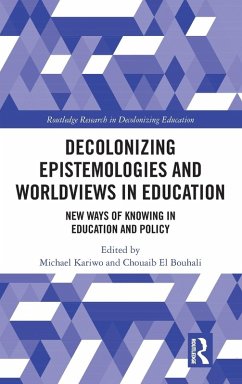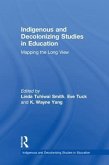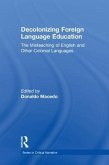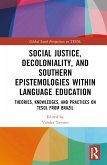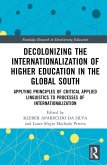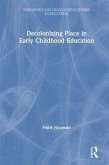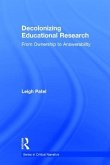Decolonizing Epistemologies and Worldviews in Education
New Ways of Knowing in Education and Policy
Herausgeber: Kariwo, Michael; El Bouhali, Chouaib
Decolonizing Epistemologies and Worldviews in Education
New Ways of Knowing in Education and Policy
Herausgeber: Kariwo, Michael; El Bouhali, Chouaib
- Gebundenes Buch
- Merkliste
- Auf die Merkliste
- Bewerten Bewerten
- Teilen
- Produkt teilen
- Produkterinnerung
- Produkterinnerung
This edited volume examines the decolonization of worldviews and ways of knowing in education and educational policy. It critically challenges the Western interpretation of epistemology and ontology, providing a platform for contributors to demonstrate how concepts of decolonization, knowledge and worldviews are understood.
Andere Kunden interessierten sich auch für
![Indigenous and Decolonizing Studies in Education Indigenous and Decolonizing Studies in Education]() Indigenous and Decolonizing Studies in Education181,99 €
Indigenous and Decolonizing Studies in Education181,99 €![Decolonizing Foreign Language Education Decolonizing Foreign Language Education]() Decolonizing Foreign Language Education179,99 €
Decolonizing Foreign Language Education179,99 €![Social Justice, Decoloniality, and Southern Epistemologies within Language Education Social Justice, Decoloniality, and Southern Epistemologies within Language Education]() Social Justice, Decoloniality, and Southern Epistemologies within Language Education149,99 €
Social Justice, Decoloniality, and Southern Epistemologies within Language Education149,99 €![Decolonizing the Internationalization of Higher Education in the Global South Decolonizing the Internationalization of Higher Education in the Global South]() Decolonizing the Internationalization of Higher Education in the Global South171,99 €
Decolonizing the Internationalization of Higher Education in the Global South171,99 €![Decolonizing Place in Early Childhood Education Decolonizing Place in Early Childhood Education]() Fikile NxumaloDecolonizing Place in Early Childhood Education167,99 €
Fikile NxumaloDecolonizing Place in Early Childhood Education167,99 €![Teaching Toward a Decolonizing Pedagogy Teaching Toward a Decolonizing Pedagogy]() Victoria F. TrinderTeaching Toward a Decolonizing Pedagogy176,99 €
Victoria F. TrinderTeaching Toward a Decolonizing Pedagogy176,99 €![Decolonizing Educational Research Decolonizing Educational Research]() Leigh PatelDecolonizing Educational Research185,99 €
Leigh PatelDecolonizing Educational Research185,99 €-
-
-
This edited volume examines the decolonization of worldviews and ways of knowing in education and educational policy. It critically challenges the Western interpretation of epistemology and ontology, providing a platform for contributors to demonstrate how concepts of decolonization, knowledge and worldviews are understood.
Produktdetails
- Produktdetails
- Verlag: Routledge
- Seitenzahl: 266
- Erscheinungstermin: 20. Juni 2025
- Englisch
- Abmessung: 235mm x 157mm x 19mm
- Gewicht: 540g
- ISBN-13: 9781032769349
- ISBN-10: 1032769343
- Artikelnr.: 73326426
- Herstellerkennzeichnung
- Libri GmbH
- Europaallee 1
- 36244 Bad Hersfeld
- gpsr@libri.de
- Verlag: Routledge
- Seitenzahl: 266
- Erscheinungstermin: 20. Juni 2025
- Englisch
- Abmessung: 235mm x 157mm x 19mm
- Gewicht: 540g
- ISBN-13: 9781032769349
- ISBN-10: 1032769343
- Artikelnr.: 73326426
- Herstellerkennzeichnung
- Libri GmbH
- Europaallee 1
- 36244 Bad Hersfeld
- gpsr@libri.de
Michael Kariwo is Instructor in the Faculty of Education at the University of Alberta, Canada. Chouaib El Bouhali is Adjunct Professor, University of Alberta, Canada.
Part 1: Theory 1. Totalizing Worldview or Multicentric Totalization? Can
conceptual reification of misapplication of onto-epistemology be avoided in
education? 2. Colonizing English language in education systems as the
primary language of instruction and current state of English academic
literacy in education systems 3. Pedagogical advantages of embracing
Indigenous embodied knowledge from Turtle Island for decolonizing
educational systems and enhancing cultural engagement 4. Examining "the
White Man's Burden" Part 2: Practice 5. Changing our point of departure:
The scaffolded explanation's colonial roots and how we can rethink this
practice 6. Empowering graduate students: A decolonizing mentoring model
for scholar-practitioners in a doctoral program in educational leadership
7. Assessing and identifying culturally and linguistically diverse students
for special education programs: A culturally responsive, relevant and
sustaining approach 8. Social justice education: Critical practice that can
lead to curriculum transformation 9. Decolonizing education policy and
teacher education programs: From systemic absence to equitable presence of
Internationally Educated Teachers Part 3: Case Studies 10. Rethinking
literacy learning and teaching on the prairie: A rural perspective 11.
Decolonisation of indigenous languages to mediate the resilience of
students in African higher education institutions 12. Decolonizing
knowledges: Valuing diverse languages, environmental knowledges, knowledge
and consciousness: The Francophonie - A case of immigrant writers in the
20th century 13. Convince the prince: Towards a credible and integrative
step in decolonization and curriculum development 14. Towards the
decolonized dissertation: The experience of an Anglophone Caribbean student
conceptual reification of misapplication of onto-epistemology be avoided in
education? 2. Colonizing English language in education systems as the
primary language of instruction and current state of English academic
literacy in education systems 3. Pedagogical advantages of embracing
Indigenous embodied knowledge from Turtle Island for decolonizing
educational systems and enhancing cultural engagement 4. Examining "the
White Man's Burden" Part 2: Practice 5. Changing our point of departure:
The scaffolded explanation's colonial roots and how we can rethink this
practice 6. Empowering graduate students: A decolonizing mentoring model
for scholar-practitioners in a doctoral program in educational leadership
7. Assessing and identifying culturally and linguistically diverse students
for special education programs: A culturally responsive, relevant and
sustaining approach 8. Social justice education: Critical practice that can
lead to curriculum transformation 9. Decolonizing education policy and
teacher education programs: From systemic absence to equitable presence of
Internationally Educated Teachers Part 3: Case Studies 10. Rethinking
literacy learning and teaching on the prairie: A rural perspective 11.
Decolonisation of indigenous languages to mediate the resilience of
students in African higher education institutions 12. Decolonizing
knowledges: Valuing diverse languages, environmental knowledges, knowledge
and consciousness: The Francophonie - A case of immigrant writers in the
20th century 13. Convince the prince: Towards a credible and integrative
step in decolonization and curriculum development 14. Towards the
decolonized dissertation: The experience of an Anglophone Caribbean student
Part 1: Theory 1. Totalizing Worldview or Multicentric Totalization? Can
conceptual reification of misapplication of onto-epistemology be avoided in
education? 2. Colonizing English language in education systems as the
primary language of instruction and current state of English academic
literacy in education systems 3. Pedagogical advantages of embracing
Indigenous embodied knowledge from Turtle Island for decolonizing
educational systems and enhancing cultural engagement 4. Examining "the
White Man's Burden" Part 2: Practice 5. Changing our point of departure:
The scaffolded explanation's colonial roots and how we can rethink this
practice 6. Empowering graduate students: A decolonizing mentoring model
for scholar-practitioners in a doctoral program in educational leadership
7. Assessing and identifying culturally and linguistically diverse students
for special education programs: A culturally responsive, relevant and
sustaining approach 8. Social justice education: Critical practice that can
lead to curriculum transformation 9. Decolonizing education policy and
teacher education programs: From systemic absence to equitable presence of
Internationally Educated Teachers Part 3: Case Studies 10. Rethinking
literacy learning and teaching on the prairie: A rural perspective 11.
Decolonisation of indigenous languages to mediate the resilience of
students in African higher education institutions 12. Decolonizing
knowledges: Valuing diverse languages, environmental knowledges, knowledge
and consciousness: The Francophonie - A case of immigrant writers in the
20th century 13. Convince the prince: Towards a credible and integrative
step in decolonization and curriculum development 14. Towards the
decolonized dissertation: The experience of an Anglophone Caribbean student
conceptual reification of misapplication of onto-epistemology be avoided in
education? 2. Colonizing English language in education systems as the
primary language of instruction and current state of English academic
literacy in education systems 3. Pedagogical advantages of embracing
Indigenous embodied knowledge from Turtle Island for decolonizing
educational systems and enhancing cultural engagement 4. Examining "the
White Man's Burden" Part 2: Practice 5. Changing our point of departure:
The scaffolded explanation's colonial roots and how we can rethink this
practice 6. Empowering graduate students: A decolonizing mentoring model
for scholar-practitioners in a doctoral program in educational leadership
7. Assessing and identifying culturally and linguistically diverse students
for special education programs: A culturally responsive, relevant and
sustaining approach 8. Social justice education: Critical practice that can
lead to curriculum transformation 9. Decolonizing education policy and
teacher education programs: From systemic absence to equitable presence of
Internationally Educated Teachers Part 3: Case Studies 10. Rethinking
literacy learning and teaching on the prairie: A rural perspective 11.
Decolonisation of indigenous languages to mediate the resilience of
students in African higher education institutions 12. Decolonizing
knowledges: Valuing diverse languages, environmental knowledges, knowledge
and consciousness: The Francophonie - A case of immigrant writers in the
20th century 13. Convince the prince: Towards a credible and integrative
step in decolonization and curriculum development 14. Towards the
decolonized dissertation: The experience of an Anglophone Caribbean student

